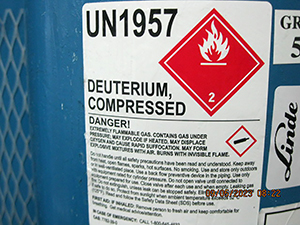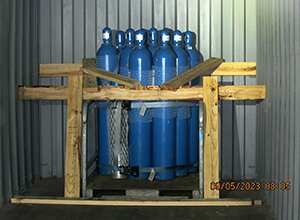U.S. Customs and Border Protection officers seized a shipment of China-bound deuterium cylinders in Norfolk on October 18 for violating nuclear nonproliferation licensing laws.
Deuterium is a stable isotope of hydrogen. It is used in military, industrial, and scientific applications and requires a license to be exported to China. Exportation of deuterium is regulated by the U.S. Department of Commerce’s Bureau of Industry and Security.
On August 22, CBP’s National Targeting Center (NTC) identified the deuterium on the manifest of a shipping container destined to China. NTC requested that Norfolk CBP trade enforcement officers inspect that shipment to ensure the export was lawful. Norfolk officers inspected the container on September 6 and discovered 10 gas cylinders of deuterium and one cylinder of deuterium silane.
CBP officers detained the deuterium, and the following day requested a licensing determination from the Bureau of Industry and Security.
In August 2023, the BIS issued a rule in the Federal Register that expanded nuclear nonproliferation controls on China. Items on the Commerce Control List controlled under nuclear nonproliferation column 2 on the Commerce Country Chart now require a license for export, reexport, or transfer to China and Macau. Deuterium is on that Commerce Control List.
Also in August, the U.S. Nuclear Regulatory Commission published an order in the Federal Register suspending license authority required to export special nuclear material, source material, and deuterium for nuclear end use to China.
On October 11, BIS determined that the deuterium cylinders were prohibited for export without a required export license and requested that CBP seize the cylinders.
On October 18, CBP officers seized the deuterium cylinders. The deuterium was assessed at a little more than $175,000. It was being shipped from Hunterdon County, N.J.

“This seizure demonstrates how Customs and Border Protection contributes our border and trade facilitation authorities to assist partner agencies in intercepting illicit, and potentially dangerous shipments,” said Mark Laria, CBP’s Area Port Director for the Area Port of Norfolk – Newport News. “CBP places a significant emphasis on enforcing laws and regulations governing imports and exports because it is vital to the economic and physical security of the United States.”
CBP’s border security mission is led at our nation’s Ports of Entry by CBP officers and agriculture specialists from the Office of Field Operations. CBP screens international travelers and cargo and searches for illicit narcotics, unreported currency, weapons, counterfeit consumer goods, prohibited agriculture, invasive weeds and pests, and other illicit products that could potentially harm the American public, U.S. businesses, and our nation’s safety and economic vitality.




